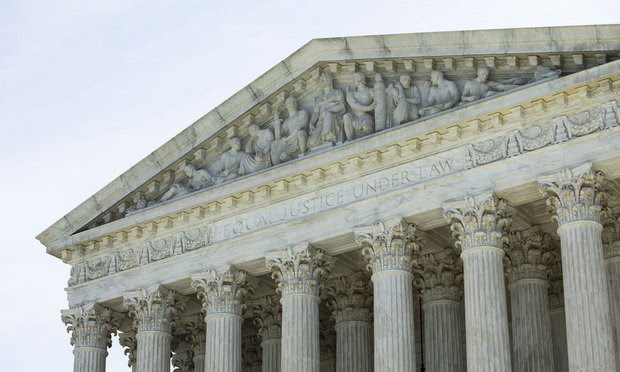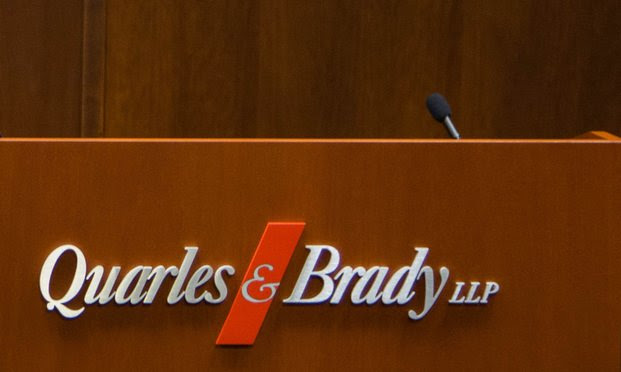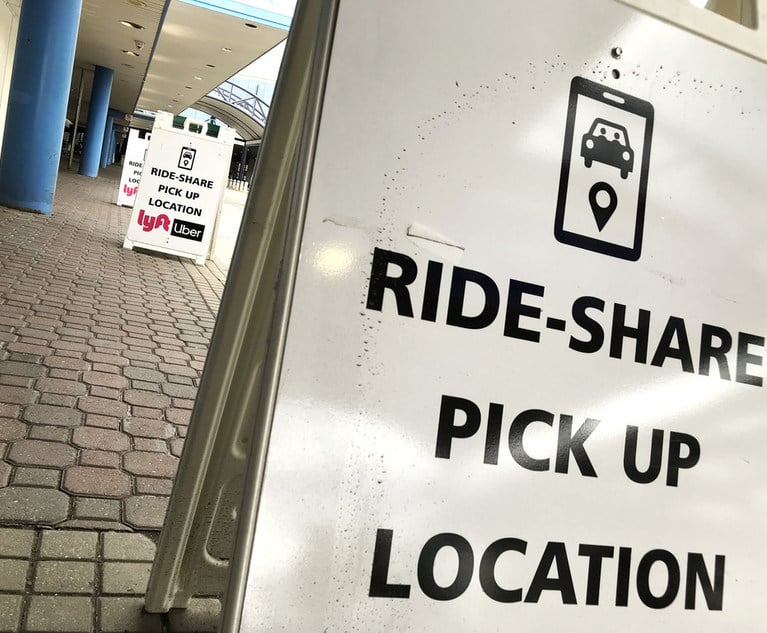Labor of Law: SCOTUS Docket Watch: New Rulings | ERISA Class Rebuts 'Apocalyptic Warnings' | DOL Judge Tosses Lawyer's SOX Complaint | Who Got the Work
Welcome to Labor of Law! We've got a couple new SCOUTS rulings to talk about, and an ERISA class is urging the justices not to touch a 3rd Circuit decision. In case you missed it: check out a new SOX complaint dismissal order from the US Labor Department. Scroll down for Who Got the Work, moves and much more.
February 27, 2020 at 12:00 PM
14 minute read
Welcome back to Labor of Law, our weekly look at news and trends affecting the L&E community. On the clock this week: US Supreme Court docket watch | Calif. judge sounds alarm for gig companies | ALJ dismisses ex-Morgan Stanley lawyer's SOX complaint | Who Got the Work | L&E headlines: Automation, coronavirus and the workplace, and more Thanks for reading, and we'd love your feedback. Tips and suggestions are welcome. I'm Mike Scarcella in Washington, and you can reach me at [email protected] and on Twitter @MikeScarcella.

US Supreme Court Watch: New Rulings
The U.S. Supreme Court this week issued rulings in two separate labor and employment cases, one involving the Employee Retirement Income Security Act and the other, Title VII's bar on employment discrimination because of religion.
The closely watched case Intel Corporation Investment Policy Committee v. Sulyma centered on ERISA's requirement that a plaintiff with "actual knowledge" of an alleged fiduciary breach file suit within three years of gaining that knowledge, otherwise the longer filing period of six years applies.
In an unanimous opinion by Justice Samuel Alito Jr., the justices ruled for Christopher Sulyma, who had argued he did not have "actual knowledge" because he did not remember reading relevant disclosures on the company website and was unaware of the allegedly imprudent investments while working at Intel.
"Although ERISA does not define the phrase 'actual knowledge," its meaning is plain," Alito wrote. "When Congress passed ERISA, the word 'actual' meant what it means today: 'existing in fact or reality.' Thus, to have 'actual knowledge' of a piece of information, one must in fact be aware of it." Sulyma was not, said Alito.
Matthew Wessler of Gupta Wessler represented Sulyma. Intel's counsel was former Obama-era U.S. solicitor general Donald Verrilli Jr. of Munger, Tolles & Olson.
Earlier in the week, the justices also turned away a petition in which Darrell Patterson claimed his employer Walgreen Co. violated Title VII by not accommodating his religious observance. The denial of review drew a concurring opinion by Alito, who was joined by justices Clarence Thomas and Neil Gorsuch.
Alito said he agreed with the views of the U.S. solicitor general that the court should reconsider a 1977 ruling that Title VII does not require an employer to make any accommodation for an employee's practice of religion if doing so would impose more than a de minimis burden. "As the Solicitor General observes, [Trans World Airlines v. ] Hardison's reading does not represent the most likely interpretation of the statutory term 'undue hardship,'" wrote Alito, adding that the Patterson case was not the appropriate vehicle to revisit that decision.
Patterson's counsel was Gene Schaerr of Schaerr | Jaffe. Walgreens was represented by Jenner & Block partner Adam Unikowsky. —Marcia Coyle

Calif. Judge Sounds Alarm for Gig Companies
Instacart is vowing to appeal a ruling from a state judge in San Diego who found California law requires the same-day grocery delivery company to classify its "shoppers" as employees—and pay and provide them benefits accordingly, my colleague Ross Todd in California writes.
San Diego Superior Court Judge Timothy Taylor granted San Diego's request for a preliminary injunction. The judge said all three branches of California's government have weighed in on the state's "unapologetically pro-employee" policy.
San Diego City Attorney Mara W. Elliott called the ruling "a warning" to other companies. "As the court said, 'The handwriting is on the wall,'" she said. "California has had two years since the Supreme Court's Dynamex decision to distinguish between a contractor and an employee. Everyone, not just Instacart, must live up to their legal responsibilities; they cannot ignore the significance of what occurred here."
Fisher Phillips's Richard Meneghello told ALM: "The big-picture takeaway here is that I think many cities might view this action as a blueprint for how they might go after other companies."
Meneghello said he hopes that the judge's move to stay enforcement might allow potential legislative changes to AB5 or a potential ballot initiative being pondered by gig companies to move forward before large-scale reclassification of gig workers. "I think most people involved in this recognize this is such a fluid issue right now and that many people feel like AB5 got ahead of itself," Meneghello said.
>> More reading at NBC News here and at Fisher Phillips' Gig Employer Blog here.

ALJ Dismisses Ex-Morgan Stanley Lawyer's Whistleblower Complaint
A retaliation claim brought by a former Morgan Stanley in-house lawyer who was based at a subsidiary in Hong Kong falls outside the scope of a federal corporate fraud law that more broadly protects domestic whistleblowers, a U.S. Labor Department judge said in a new order that embraces earlier decisions limiting the reach of the statute.
The ruling against Christopher Garvey, formerly among Morgan Stanley's top lawyers in Hong Kong, was the latest decision exploring the contours of anti-retaliation provisions of the Sarbanes-Oxley Act of 2002. Garvey alleged Morgan Stanley leaders forced him out after he raised concerns about alleged foreign bribery and securities regulations. The company has denied the allegations.
The evidence in Garvey's complaint, filed in 2016 at the Labor Department, shows he "worked entirely outside of the United States," Francine Applewhite, an administrative law judge in Washington, said in her ruling dismissing the claims. Where an employee works, the judge said, "is the key factor to consider when deciding whether a claim is a domestic or extraterritorial application" of the Sarbanes-Oxley Act's whistleblower protections.
 Representatives for Morgan Stanley, including a spokesperson and a lawyer who advocated for the bank at the Labor Department, did not return messages seeking comment. Morgan Stanley was represented by Morgan, Lewis & Bockius partner Sara Bouchard (at left), who is based in Philadelphia and serves as the co-leader of the firm's whistleblower group.
Representatives for Morgan Stanley, including a spokesperson and a lawyer who advocated for the bank at the Labor Department, did not return messages seeking comment. Morgan Stanley was represented by Morgan, Lewis & Bockius partner Sara Bouchard (at left), who is based in Philadelphia and serves as the co-leader of the firm's whistleblower group.
Applewhite's ruling, dated Feb. 13, did not confront the merits of Garvey's contention that Morgan Stanley took adverse employment actions against him in response to raising concerns about alleged misconduct. Garvey was not reached for comment.
>> More reading here at Law.com at how the DOL's administrative review board has ruled in recent SOX cases involving overseas employees.

Who Got the Work
>> Husch Blackwell partner Patrick Harvey in Milwaukee argued for the Wisconsin Physicians Service Insurance Corporation (WPS) in an Americans with Disabilities Act case in the U.S. Court of Appeals for the 7th Circuit. A panel recently upheld a trial judge's ruling that granted summary judgment to WPS. David Schoenberger of Bakke Norman argued for the former agency sales representative who alleged discrimination.
>> Jerome Schlichter of the St. Louis firm Schlichter Bogard & Denton is counsel to University of Pennsylvania employees and retirees at the U.S. Supreme Court. Schlichter on Wednesday urged the justices not to disturb a Third Circuit decision reviving core claims in an ERISA class action. Penn is represented by Morgan Lewis partner David Salmons, co-chair of the appellate practice. The firms Wilmer Cutler Pickering Hale and Dorr and Goodwin Procter filed amicus briefs backing Penn.
>> Littler Mendelson represented several business groups who unsuccessfully challenged a New York city law that requires "predictable scheduling for fast-food and retail workers is not preempted by state wage laws," Reuters reported.
>> A team from Jackson Lewis, including Victoria Woodin Chavey, is defending New Jersey-based firm McElroy, Deutsch, Mulvaney & Carpenter in a case alleging retaliation and disability discrimination. Connecticut plaintiffs firm Livingston, Adler, Pulda, Meiklejohn & Kelly represents the former employee, a legal assistant. McElroy Deutsch recently lost its bid for summary judgment in the U.S. federal district court in Connecticut.
>> A former associate general counsel and vice president for the Miami Heat alleges in a federal lawsuit that the NBA team and its top lawyer retaliated against her after she adopted a baby and took maternity leave. Vered Yakovee worked in the Heat's legal department from March 2015 until December 2019. Yakovee is represented by Erika Rotbart of Deutsch Rotbart & Associates in Boca Raton, Florida.

Around the Water Cooler…
Automation
AI Is the Next Workplace Disrupter—and It's Coming for High-Skilled Jobs. "Artificial intelligence—programming machines to think more like humans—is expected to alter how Americans work on a scale similar to the impact of robotics and desktop computers. But employees affected by it are much more likely to be in management or professional roles than laborers turning screws or filing papers. The most vulnerable occupations include marketing specialists, financial advisers and computer programmers—jobs that tend to pay high wages and skew toward male, white and Asian workers, a recent study from the Brookings Institution found." [WSJ] Read the Brookings study here.
Should Robots Have a Face? "Retailers said their robot designs were not explicitly meant to assuage angst about job losses. Still, companies of all sizes—from Carrefour in Spain to Schnucks supermarket in St. Louis—are investing in tens of thousands of friendly looking robots that are quickly upending human work. Most of the retail robots have just enough human qualities to make them appear benign, but not too many to suggest they are replacing humans entirely." [NYT]
Treat Workers Like Robots and They Might Behave Like Them. "Treating people like robots incurs the very real risk that they will behave like robots. And if the business is burning? Don't expect them to hit the fire alarm." [Financial Times]
Workplace policy
Breaking the Salary Sharing Taboo. "Open discussions of pay lay bare some of the basic contradictions that govern so many workplaces, which claim to embrace their workers like family while insisting, all the while, on professionalism and discretion. They are communities whose members care about one another and yet also know that their respective right to belong is based on their utility, perceived or actual. To ask a co-worker her salary—especially one who has worked at an institution for years—opens up deeper, unsettling questions. How valued are you in this community?" [NYT]
Coronavirus, Employment Law and You. "Employers should avoid providing medical opinions or misinformation about the effects and spreading of the virus. Prudent employers should communicate consistent with official government guidelines from the CDC and other official sources," writes attorney Steven L. Schwarzberg in Florida. [Law.com]
Cutting Through the Haze of Marijuana in the Workplace. "There is a tremendous gray area surrounding the legalization of marijuana and how that could impact the workplace. This much is clear: employers should ensure the structure and enforcement of their workplace drug policies comply with state and federal law and then clearly convey any workplace drug requirements to employees," Proskauer's Evandro Gigante and Hayley Fritchie write. [Bloomberg Law]
 The Great Google Revolt. "As similar forms of worker activism have spread to other companies, including Amazon and Microsoft, it has also raised deeper questions about the nature of the entire industry. Silicon Valley has often held itself up as a highly evolved ecosystem that defies the usual capital-labor dichotomy—a place where investors, founders, executives and workers are all far too dependent on one another to make anything so crass as class warfare. The recent developments at Google have thrown that egalitarian story into doubt, showing that even in the most rarefied corners of Silicon Valley, the bosses are willing to close ranks and shut down debate when the stakes are high enough." [NYT]
The Great Google Revolt. "As similar forms of worker activism have spread to other companies, including Amazon and Microsoft, it has also raised deeper questions about the nature of the entire industry. Silicon Valley has often held itself up as a highly evolved ecosystem that defies the usual capital-labor dichotomy—a place where investors, founders, executives and workers are all far too dependent on one another to make anything so crass as class warfare. The recent developments at Google have thrown that egalitarian story into doubt, showing that even in the most rarefied corners of Silicon Valley, the bosses are willing to close ranks and shut down debate when the stakes are high enough." [NYT]
Smokers Left in the Cold as Businesses Refuse to Hire Them. "Only 21 US states … allow companies to exclude smokers from their workforce outright. And in those areas this sort of policy has become the norm in the healthcare sector, says Dr Rogen. Now the practice is spreading, and companies in other industries are implementing similar policies. This delights anti-smoking activists. However, it has led civil liberties advocates to sound alarms about employers' creeping control over workers' lives even when they are off the clock." [Financial Times]
Virginia Would Become Fourth State to Ban Hair Discrimination. "Virginia is on the brink of becoming the fourth state to ban hair discrimination, with only the signature of the governor remaining for the prohibition to become law. The bill would amend state law, adding a section that specifically bans discrimination based on 'traits historically associated with race, including hair texture, hair type, and protective hairstyles such as braids, locks, and twists.'" [CNN]
Courts and cases
U.S. Soccer's New Defense in Equal Pay Case: Blame the Women's Union. "The Federation's new brief argued that even if the women can show that they were paid less for equal work, they can't blame the disparity on sex discrimination. Instead, according to U.S. Soccer, the women should lay responsibility for their pay at the feet of their own union." [Reuters] More here at the NYT.
Weinstein Verdict Signals Cultural Shift on Sexual Assault. "The major takeaway from this is that…people are beginning to understand the complexity of sexual harassment and sexual abuse in the workplace, and there are going to be consequences," Brenda V. Smith of American University Washington College of Law said. [WSJ]
Federal agencies
Labor Board Impedes Fast-Food, Contract Workers' Ability to Unionize. "The federal panel that arbitrates management-labor disputes will issue a rule this week that is expected to limit the ability of employees at fast-food restaurants and staffing firms to organize unions. The rule by the National Labor Relations Board was supported by employer organizations and opposed by labor unions. It will set a stricter standard for when a worker can claim to be employed by two separate businesses, such as a nationwide restaurant chain and the company that operates a franchise." [WSJ] Mere here at NYT. A post at the On Labor blog: The NLRB's Final Joint-Employer Rule Moves Labor Law Backwards. The NLRB's announcement is here.
Labor Chief Scalia Asserts Review Power Over DOL Judicial Panel. "Labor Secretary Eugene Scalia is giving himself new authority to review decisions made on his behalf by the department's in-house judicial board, part of a package of secretarial orders announced by the agency. Scalia, in his first series of orders since taking the helm of DOL in September, asserted a new layer of oversight on the Administrative Review Board." [Bloomberg Law]

Notable Moves & More
• Quarles & Brady LLP said it has hired partners Sarah Belger and Hans Riede and Christian Yingling, an associate, to expand the firm's labor and employment practice in Washington. Belger was most recently a partner at Odin, Feldman & Pittleman and, earlier, she worked at McGuireWoods. Riede also joined from Odin Feldman.
• Ogletree, Deakins, Nash, Smoak & Stewart has added Will Collins as an associate from Freeman Mathis & Gary. Collins represents employers nationally in labor and employment administrative charges, single-plaintiff claims and class or collective action litigation.
• Thompson Hine LLP said Dominic DeMatties has joined the firm's employee benefits and executive compensation practice in Washington. DeMatties previously was a partner at Alston & Bird and served from 2012 to 2016 as an attorney-advisor in the office of the benefits tax counsel at the U.S. Treasury Department.
This content has been archived. It is available through our partners, LexisNexis® and Bloomberg Law.
To view this content, please continue to their sites.
Not a Lexis Subscriber?
Subscribe Now
Not a Bloomberg Law Subscriber?
Subscribe Now
NOT FOR REPRINT
© 2025 ALM Global, LLC, All Rights Reserved. Request academic re-use from www.copyright.com. All other uses, submit a request to [email protected]. For more information visit Asset & Logo Licensing.
You Might Like
View All
Labor of Law: As Workers Suffer With Long Covid, Employers May Rethink Accommodations for Other Disabilities

Labor of Law: Federal Noncompete Ban Would Be Far From Last Word on Issue

Labor of Law: New Federal Rule Could Upend State Efforts to Count Ride-Share Drivers as Contractors

Labor of Law: Employer Statements on Abortion Could Spur Discrimination, Hostile Work Environment Claims
Law Firms Mentioned
- Thompson Hine
- Wilmer Cutler Pickering Hale and Dorr LLP
- Goodwin Procter
- Morgan, Lewis & Bockius
- McElroy, Deutsch, Mulvaney & Carpenter, LLP
- Freeman Mathis Gary
- Odin Feldman Pittleman
- Ogletree, Deakins, Nash, Smoak & Stewart, P.C.
- Jackson Lewis P.C.
- Littler Mendelson
- Fisher Phillips
- Munger, Tolles & Olson
- Husch Blackwell
Trending Stories
- 1Eliminating Judicial Exceptions: The Promise of the Patent Eligibility Restoration Act
- 2AI in Legal: Disruptive Potential and Practical Realities
- 3One Court’s Opinion on Successfully Bankruptcy Proofing a Borrower
- 4Making the Case for Workflow Automation
- 5Copyright Infringement by Generative AI Tools Under US and UK Law: Common Threads and Contrasting Approaches
Who Got The Work
J. Brugh Lower of Gibbons has entered an appearance for industrial equipment supplier Devco Corporation in a pending trademark infringement lawsuit. The suit, accusing the defendant of selling knock-off Graco products, was filed Dec. 18 in New Jersey District Court by Rivkin Radler on behalf of Graco Inc. and Graco Minnesota. The case, assigned to U.S. District Judge Zahid N. Quraishi, is 3:24-cv-11294, Graco Inc. et al v. Devco Corporation.
Who Got The Work
Rebecca Maller-Stein and Kent A. Yalowitz of Arnold & Porter Kaye Scholer have entered their appearances for Hanaco Venture Capital and its executives, Lior Prosor and David Frankel, in a pending securities lawsuit. The action, filed on Dec. 24 in New York Southern District Court by Zell, Aron & Co. on behalf of Goldeneye Advisors, accuses the defendants of negligently and fraudulently managing the plaintiff's $1 million investment. The case, assigned to U.S. District Judge Vernon S. Broderick, is 1:24-cv-09918, Goldeneye Advisors, LLC v. Hanaco Venture Capital, Ltd. et al.
Who Got The Work
Attorneys from A&O Shearman has stepped in as defense counsel for Toronto-Dominion Bank and other defendants in a pending securities class action. The suit, filed Dec. 11 in New York Southern District Court by Bleichmar Fonti & Auld, accuses the defendants of concealing the bank's 'pervasive' deficiencies in regards to its compliance with the Bank Secrecy Act and the quality of its anti-money laundering controls. The case, assigned to U.S. District Judge Arun Subramanian, is 1:24-cv-09445, Gonzalez v. The Toronto-Dominion Bank et al.
Who Got The Work
Crown Castle International, a Pennsylvania company providing shared communications infrastructure, has turned to Luke D. Wolf of Gordon Rees Scully Mansukhani to fend off a pending breach-of-contract lawsuit. The court action, filed Nov. 25 in Michigan Eastern District Court by Hooper Hathaway PC on behalf of The Town Residences LLC, accuses Crown Castle of failing to transfer approximately $30,000 in utility payments from T-Mobile in breach of a roof-top lease and assignment agreement. The case, assigned to U.S. District Judge Susan K. Declercq, is 2:24-cv-13131, The Town Residences LLC v. T-Mobile US, Inc. et al.
Who Got The Work
Wilfred P. Coronato and Daniel M. Schwartz of McCarter & English have stepped in as defense counsel to Electrolux Home Products Inc. in a pending product liability lawsuit. The court action, filed Nov. 26 in New York Eastern District Court by Poulos Lopiccolo PC and Nagel Rice LLP on behalf of David Stern, alleges that the defendant's refrigerators’ drawers and shelving repeatedly break and fall apart within months after purchase. The case, assigned to U.S. District Judge Joan M. Azrack, is 2:24-cv-08204, Stern v. Electrolux Home Products, Inc.
Featured Firms
Law Offices of Gary Martin Hays & Associates, P.C.
(470) 294-1674
Law Offices of Mark E. Salomone
(857) 444-6468
Smith & Hassler
(713) 739-1250








